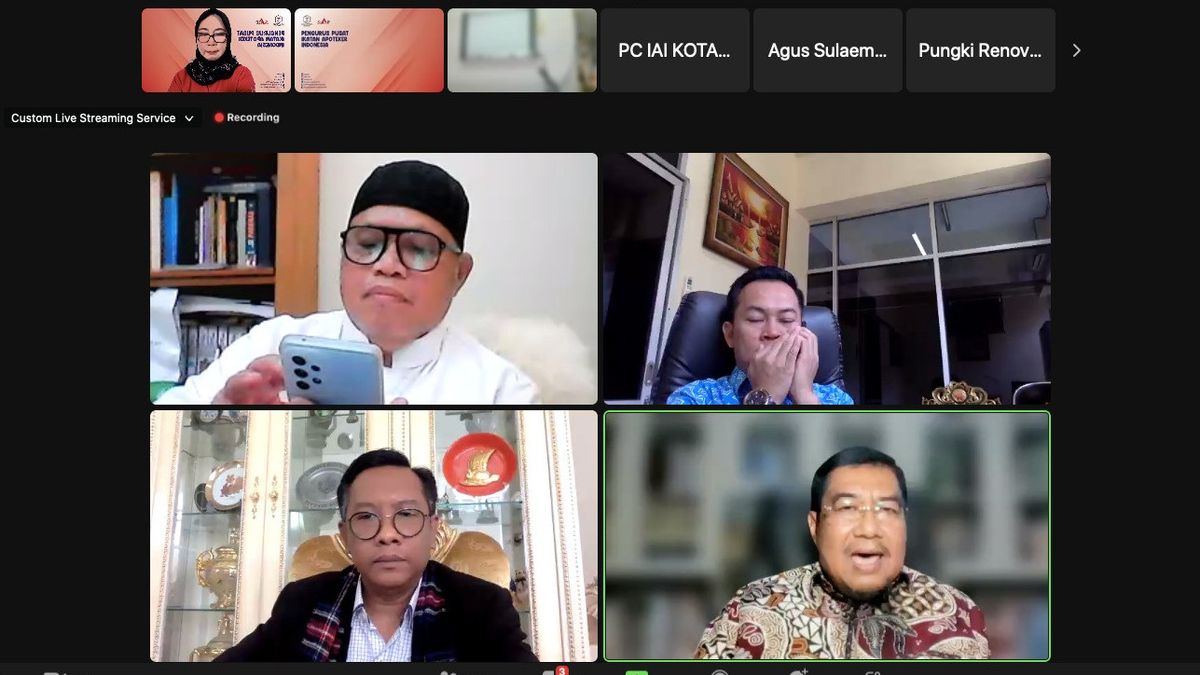JAKARTA - The Omnibus Law Health Bill, which is currently being called by the DPR RI, has the potential to cause legal problems, if this bill is enforced. Therefore, it must be reviewed before it is passed.
This is a node that can be taken from an event held by the Indonesian Pharmacists Association, on Saturday, May 13, which held the Indonesian Pharmacists' House (RAI) with speakers Masbuhin, SH, MM, MH and Drs Apt Chazali Situmorang online.
This event is an IAI effort to socialize the organization's decision to ask the Indonesian House of Representatives and the government to discuss the Omnibus Law Health Bill which is seen as keeping potential problems very large.
The event was opened by the Secretary General of PP IAI, apt Lilik Yusuf Indrajaya, SE, MM.
Masbuhin is an advocate known as Cak Buhin and has been critically investigating the contents of the Omnibus Law Health Bill. He is an advocate and Co Lawyer for PABOI East Java and a network of Muhammadiyah hospitals throughout East Java.
In a presentation entitled The Indonesian Pharmacist Association (IAI): Single bar System is a Must, Cak Buhin said that the Health Law, which was prepared with the omnibus law method, consists of 20 chapters and 478 articles by omnibus law, the 9 laws raise legal problems.
The two problems are the birth process to the discussion, as well as the contents of the Health Bill itself.
Materially, Cak Buhin saw an inconsistency of articles, issues of criminalization, discriminatory and eliminating the main and strategic authority of health professional organizations.
Cak Buhin then appointed a number of articles that removed the duties, functions and authorities of the Professional Organization in maintaining professional ethics.
In Article 274 it is stated, Konsil every group of health workers has a function e. carry out coaching in the professional technical field. Distinguish it by Article 8 letter (f) of Law No. 29/2004," explained Cak Buhin.
"Here, the authority and role of OP is lost to foster members, provide professional ethics and establish professional ethics by OP," said Cak Buhin.
Article 314 still contains the spirit of OP being a single bar, but in DIM the government number 1484 column 4 states that the Health OP is removed and changed from single bar to multi bar.
This is where the OPK that has existed so far will enter a new history in a legal uncertainty and authority that is held, then divided into groups and associations. Then submitted in Law No. 17 of 2013 Tentant Ormas.
"The legal implications, the Health Professional Organization, are like non-existence," said Cak Buhin.
"In this condition, the Health OP no longer has the authority to protect members. If there is a legal problem, members will no longer have a place to complain," said Cak Buhin.
"Therefore, IAI, a single bar is a must. It is a necessity that cannot be negotiated anymore," said Cak Buhin.
Meanwhile, apt Chazali Situmorang, Chairman of the Supervisory Board (Dewas) IAI, explained the digital footprint of the Omnibus Law Health Bill.
According to Chazali, starting last year, circulated on social and online media, academic texts (NA) and the Health Bill with an Omnibus Law approach.
"In the document, there is a 'confidential' shadow, without mentioning the source, there is no drafting team," explained Chazali Situmoran.
"The content of the academic paper has collapsed, it is not clear that the social, psychological and legal foundation has brought up more cases of implementation problems that can actually be resolved by regulations under the law," said Chazali Situmorang.
No one admitted that the government or the DPR had compiled the draft. The health community, health professional organizations are excited.
"The fraudulent material became a discussion material by OP and the funny thing is that the Ministry of Health invited OP to discuss the fake documents," said Chazali Situmorang.
After months of cat and mouse, the DPR Baleg finally delivered NA and the DPR's initiativeal Health Bill (Read Baleg), not Commission IX in charge of health.
"Why should the Omnibus Law Health Bill be rejected? Because the process is not transparent, there is a collusion between the government and the DPR," said Chazali Situmorang.
Chazali said that it was invisible hand who played, prepared the NA/RUU document prepared by the government, which should have been the initial wetting at Commission IX of the DPR RI, but was not involved from the start.
The preparation of the hasty NA/Health Bill document, not in its substance, even though many other laws were abolished, was another reason why the Omnibus Law Health Bill had to be postponed.
The English, Chinese, Japanese, Arabic, and French versions are automatically generated by the AI. So there may still be inaccuracies in translating, please always see Indonesian as our main language. (system supported by DigitalSiber.id)













